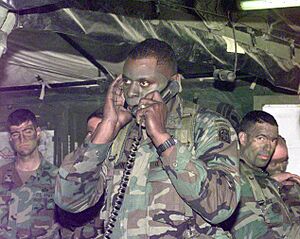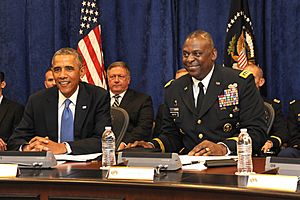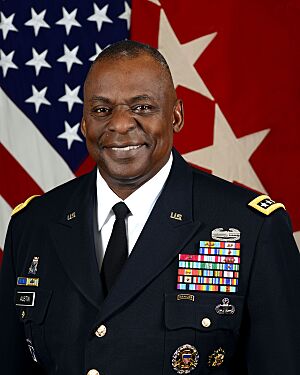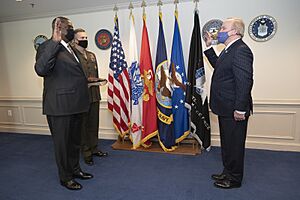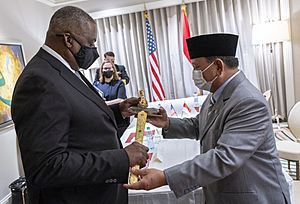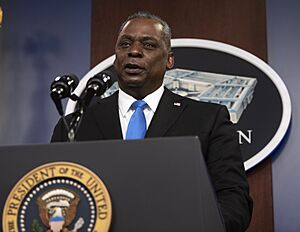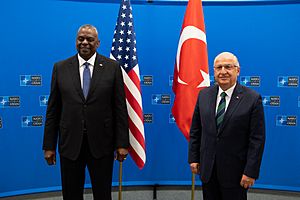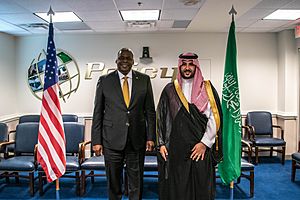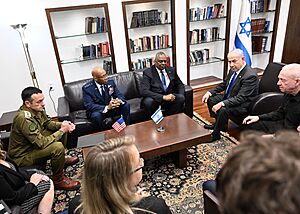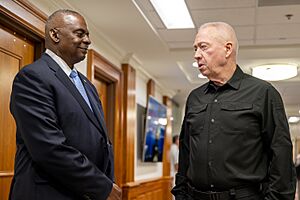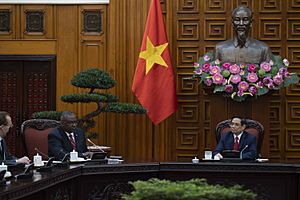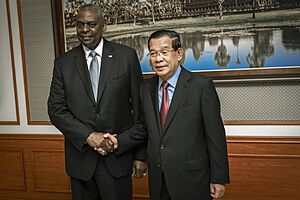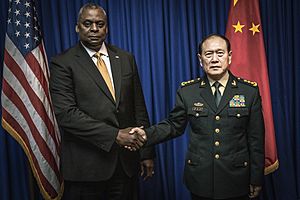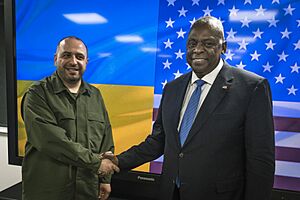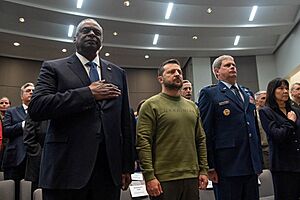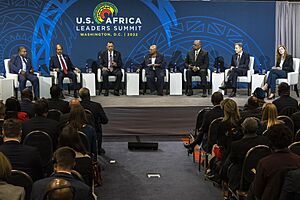Lloyd Austin facts for kids
Quick facts for kids
Lloyd Austin
|
|
|---|---|
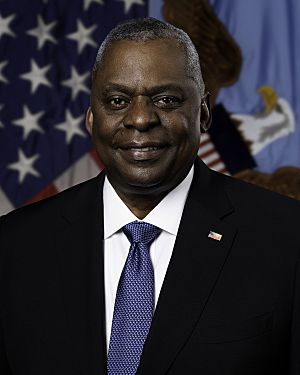
Official portrait, 2023
|
|
| 28th United States Secretary of Defense | |
| In office January 22, 2021 – January 20, 2025 |
|
| President | Joe Biden |
| Deputy |
|
| Preceded by | Mark Esper |
| Succeeded by | Pete Hegseth |
| 12th Commander of United States Central Command | |
| In office March 22, 2013 – March 30, 2016 |
|
| President | Barack Obama |
| Preceded by | Jim Mattis |
| Succeeded by | Joseph Votel |
| 33rd Vice Chief of Staff of the Army | |
| In office February 8, 2012 – March 8, 2013 |
|
| President | Barack Obama |
| Preceded by | Peter W. Chiarelli |
| Succeeded by | John F. Campbell |
| 40th Director of the Joint Staff | |
| In office August 9, 2009 – June 30, 2010 |
|
| President | Barack Obama |
| Preceded by | Stanley A. McChrystal |
| Succeeded by | William E. Gortney |
| Personal details | |
| Born |
Lloyd James Austin III
August 8, 1953 Mobile, Alabama, U.S. |
| Spouse |
Charlene Banner
(m. 1980) |
| Education |
|
| Signature |  |
| Military service | |
| Allegiance | United States |
| Branch/service | United States Army |
| Years of service | 1975–2016 |
| Rank | General |
| Commands |
|
| Battles/wars |
|
| Awards | Full list |
Lloyd James Austin III (born August 8, 1953) is a retired United States Army general. He served as the 28th United States secretary of defense from 2021 to 2025.
Before he retired from the military in 2016, Austin was the 12th commander of United States Central Command (CENTCOM). He also served as the 33rd vice chief of staff of the Army. He was also the commander of United States Forces – Iraq. Lloyd Austin is the first African American to hold each of these important positions. After leaving the military, he joined the boards of several companies. On January 22, 2021, he became the Secretary of Defense, a top leader for the U.S. military.
Austin is known for leading troops in combat in Iraq and Afghanistan at different high ranks. He was the first African American to command a division, corps, and field army in combat. He received the Silver Star, a high award for bravery, for his actions during the Iraq invasion.
Contents
Early Life and Education
Lloyd James Austin III was born on August 8, 1953, in Mobile, Alabama. He grew up in Thomasville, Georgia. In 1975, he graduated from the United States Military Academy at West Point with a science degree. While at West Point, he played rugby and ran track.
Later, he earned a master's degree in education from Auburn University in 1986. He also earned a Master of Business Administration from Webster University in 1989. He completed training at several important Army schools, including the Army War College.
Military Career
In June 1975, Austin became a second lieutenant in the Infantry after graduating from West Point. His early assignments included serving in Germany and with the 82nd Airborne Division at Fort Bragg. He also worked as an operations officer for Army recruiting in Indianapolis.
After more training, he joined the 10th Mountain Division in New York. In 1993, he returned to the 82nd Airborne Division to command the 2nd Battalion (Airborne), 505th Infantry.
Leading in Combat
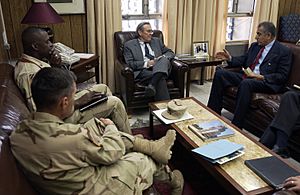
In 2001, Austin became Assistant Division Commander for the 3rd Infantry Division (Mechanized). He helped lead the division's invasion of Iraq in March 2003. He was awarded a Silver Star for his bravery during this invasion.
From 2003 to 2005, Austin was the Commanding General of the 10th Mountain Division during the War in Afghanistan. He was the first African American to lead a U.S. Army division in combat.
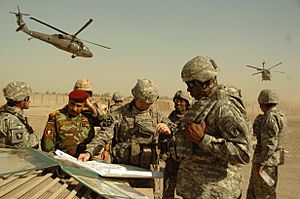
In 2006, Austin was promoted to lieutenant general and took command of the XVIII Airborne Corps. In 2008, he became the second-highest ranking commander in Iraq, leading the Multi-National Corps—Iraq (MNC-I). He was the first African American general to lead a corps-sized group in combat. He managed the withdrawal of forces from Iraq while ensuring progress continued.
Austin then became the Director of the Joint Staff in 2009. This role helped him become more widely known in the military.
Top Military Leadership Roles
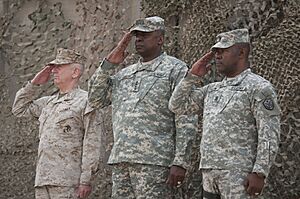
On September 1, 2010, Austin was promoted to general, becoming the Army's 200th four-star general. He then became the Commanding General of United States Forces – Iraq (USF-I). He was the first African American to command an entire theater of war. His mission was to advise and train the Iraqi Armed Forces.
Austin oversaw the end of combat operations in Iraq and the shift to stability operations. He managed the careful withdrawal of about 50,000 U.S. service members by the end of 2011.
In December 2011, Austin was chosen to be the Vice Chief of Staff of the United States Army (VCSA). He started this role in January 2012. As VCSA, he helped manage the Army's budget and staff. He also worked to improve mental health support for soldiers.
Austin became the commander of CENTCOM in March 2013. In this role, he oversaw all U.S. troops and major military operations in the Middle East, Central, and South Asia. This area included 20 countries like Iraq, Syria, and Afghanistan.
During his time at CENTCOM, Austin advised the president and other leaders on challenges in the region. He directed U.S. military responses to many crises. These included the rise of ISIL (also known as ISIS) in Iraq and Syria.
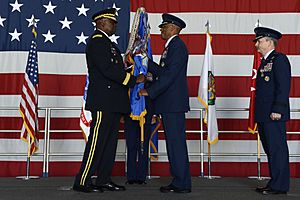
After ISIL took control of Mosul in June 2014, Austin led the plan to fight ISIL in Iraq and Syria. This plan was called Combined Joint Task Force – Operation Inherent Resolve (CJTF-OIR). This effort involved many airstrikes against ISIL targets. By 2017, ISIL had lost most of the territory they once controlled.
Austin retired from the military on April 5, 2016. He said he was very proud of what the troops under his command had achieved.
Private Sector Work
After retiring from the military, Austin joined the boards of several companies. These included Raytheon Technologies, a military contractor, Nucor, and Tenet Healthcare. He also worked with a consulting firm and an investment company.
Secretary of Defense (2021–2025)
In December 2020, President-elect Joe Biden nominated Austin to be the Secretary of Defense. Biden trusted Austin from their time working together when Austin was CENTCOM commander. To become Secretary of Defense, Austin needed a special approval from Congress because he had not been retired from the military for seven years. Congress approved this waiver.
On January 22, 2021, the Senate confirmed Austin by a vote of 93–2. He was sworn in later that day, becoming the first African American Secretary of Defense.
Key Priorities
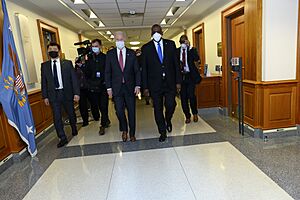
When Austin became Secretary of Defense, he announced three main priorities:
- Defending the Nation: Making sure the U.S. is safe from threats.
- Taking care of our people: Supporting military members and their families.
- Succeeding through teamwork: Working well with others inside and outside the military.
He also focused on the COVID-19 pandemic within the military. He encouraged service members to get vaccinated and took the vaccine himself to show it was safe.
Austin also worked to strengthen U.S. deterrence, especially against challenges from countries like China and Russia. He aimed to build a strong military and work with allies.
Hospitalization and Transparency
In January 2024, Austin was hospitalized for a medical procedure. The Department of Defense did not immediately tell the President or the public about his hospitalization. This caused concern about transparency.
Austin later apologized, saying, "We did not handle this right, and I did not handle this right. I should have told the President about my cancer diagnosis. I should have also told my team and the American public. And I take full responsibility." He explained that there were no gaps in leadership and that new procedures were put in place to prevent similar communication issues in the future.
Middle East Engagement

Throughout his time as Secretary of Defense, Austin worked with leaders in the Middle East. He focused on strengthening partnerships and security in the region. This included working on missile defense, maritime security, and sharing information.
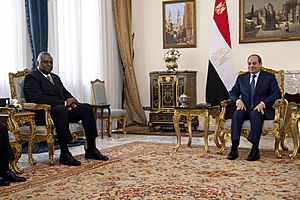
Austin emphasized that alliances are a key strength for America, especially in the Middle East. He stated that the U.S. works with friends in the region to prevent aggression, stop terrorist groups, and keep important waterways safe.
Austin also expressed concerns about Iran's actions in the region, such as supporting terrorism and developing advanced weapons. He stressed the importance of working with allies like Saudi Arabia and Israel to address these issues. In February 2021, he coordinated airstrikes against an Iranian-backed group in Syria in response to attacks on Americans in Iraq.
Fighting Terrorism
Austin stated that groups like ISIS and al-Qaeda continue to threaten the U.S. He supported investments in new technology for counterterrorism efforts.
In December 2023, Austin announced Operation Prosperity Guardian. This was a group of countries working together to stop attacks from Houthis in Yemen on commercial ships in the Red Sea. The goal was to ensure safe travel for ships and improve regional security.
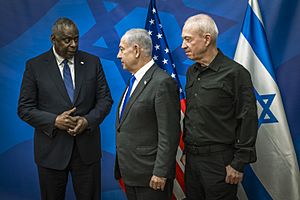
Austin also spoke about the importance of staying alert and working together to fight global terrorism. He highlighted that success against ISIS comes from determination, teamwork, and being able to adapt.
Support for Israel
Austin consistently stated that America's commitment to Israel's security is "ironclad" and "not negotiable." In January 2023, the U.S. and Israel held their largest joint military exercise ever, called Juniper Oak 23.2.
After the Hamas attack on Israel in October 2023, Austin sent a U.S. Navy carrier strike group to the Eastern Mediterranean to show support. He visited Israel and met with defense leaders, reaffirming U.S. support. The U.S. also provided military aid to Israel.
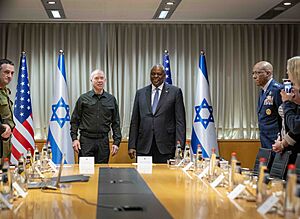
Austin also expressed strong concerns about the humanitarian situation in Gaza. He called for more humanitarian aid to be delivered and emphasized the need to protect civilians. The U.S. airlifted humanitarian supplies to Gaza and established a temporary pier to deliver aid by sea.
In July 2024, the U.S. resumed shipments of certain bombs to Israel. In October 2024, Austin discussed the killing of Hamas leader Yahya Sinwar, calling it a "major achievement in counterterrorism." He also supported Israel's ground offensive against Hezbollah in southern Lebanon.
Indo-Pacific Focus
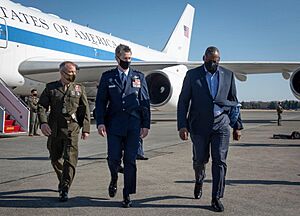
Austin focused on the Indo-Pacific region, seeing China as a major challenge. He worked to strengthen U.S. military presence and exercises with partners like Japan and the Philippines. He made many official visits to the region during his time as Secretary of Defense.
In March 2021, Austin visited Japan and South Korea with Secretary of State Antony Blinken. This trip showed the U.S. commitment to its allies and to maintaining peace in the region. They discussed concerns about China's growing influence and North Korea's nuclear threat.
Austin also worked to strengthen defense ties with India. He urged India to reconsider buying a Russian missile system and emphasized the growing partnership between the U.S. and India.
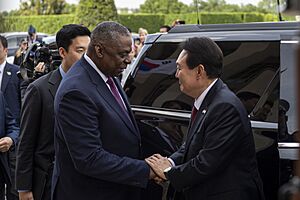
Austin condemned China's military activity near Taiwan. He stated that the U.S. would continue to help Taiwan defend itself. He also secured U.S. military access to bases in the Philippines to help with regional security.
In November 2023, Austin attended the ASEAN Defense Ministers' Meeting in Indonesia. He stressed the U.S. commitment to working with Southeast Asian partners for a stable and prosperous region.
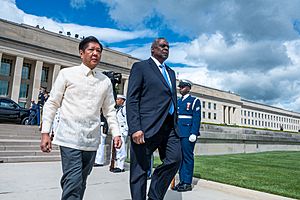
AUKUS Partnership In September 2021, the U.S., United Kingdom, and Australia formed a security partnership called AUKUS. Its goal is to share information and technology to strengthen defense. One part of AUKUS is helping Australia get nuclear-powered submarines. Another part is developing new technologies like artificial intelligence and electronic warfare.
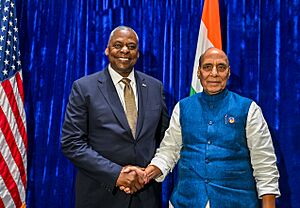
Austin emphasized that the AUKUS partnership shows a shared vision for a free and open Indo-Pacific region. He highlighted that the three countries believe in international law and peaceful ways to solve problems.
Afghanistan Withdrawal
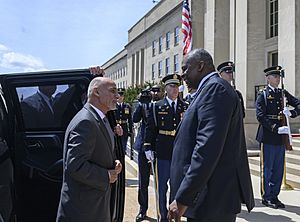
In February 2021, Austin stated that the Biden Administration was still deciding on the withdrawal of U.S. troops from Afghanistan. In April 2021, President Biden announced that all U.S. troops would leave Afghanistan by September 11, 2021.
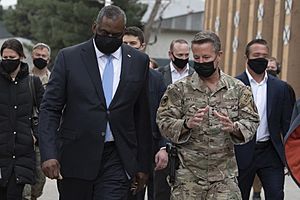
After the U.S. withdrawal began, the Taliban quickly took control of Afghanistan. In August 2021, the U.S. deployed troops to Kabul Airport to help evacuate embassy staff and others. This became one of the largest airlifts in history, evacuating over 120,000 people. On August 26, 2021, a terrorist attack at the airport killed many civilians and 13 U.S. service members. The last American service member left Afghanistan on August 30, 2021.
Support for Ukraine
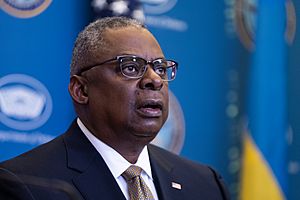
When Russia invaded Ukraine in February 2022, Austin immediately ordered 7,000 U.S. military personnel to Europe to support Ukraine. The U.S. and its allies provided billions of dollars in military aid to Ukraine, including missiles, ammunition, and other equipment.
In April 2022, Austin and Secretary of State Antony Blinken visited Kyiv, Ukraine, to meet with President Volodymyr Zelenskyy. They discussed America's strong support for Ukraine.
Austin also started the Ukraine Defense Contact Group (UDCG), a forum where nearly 40 nations met to discuss how to support Ukraine. He stated that the goal was to help Ukraine win the fight against Russia's invasion and build up Ukraine's defenses for the future. He called Russia's invasion "baseless, reckless and lawless."
The UDCG has grown to include over 50 countries. They have provided more than $106 billion in security assistance to Ukraine. This aid includes air defense systems, tanks, artillery, and training for Ukrainian soldiers.
Austin emphasized that the war in Ukraine matters deeply to America and the world. He stated that if countries do not stand up to aggression, it will encourage more conflict. He visited Ukraine multiple times to show continued U.S. support.
In June 2024, President Joe Biden and President Zelenskyy signed a 10-year security agreement. This pact aims to strengthen Ukraine's ability to defend itself and prevent future aggression.
Africa Tour
In September 2023, Austin made his first trip to Africa as Secretary of Defense. He visited Djibouti, Kenya, and Angola. He met with leaders to strengthen partnerships and work together against terrorism.
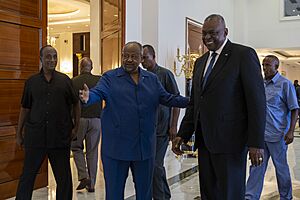
Austin stated that Africa is very important for global prosperity and security. He emphasized that the U.S. seeks strong and equal partnerships with African nations. He also shared his personal story, noting that he grew up in a time of segregation in America and became the first Black Secretary of Defense.
Farewell Ceremony
Austin was honored with a farewell ceremony on January 17, 2025. He praised the Department of Defense's achievements during his four years, saying they "stood up to our rivals, we've weakened our foes, strengthened our friends, invested in our future, and done right by our people."
Austin received a traditional "clap-out" ceremony as he left the Pentagon on his final day.
Personal Life
Austin was raised by a Catholic mother and continues to practice his faith.
He has been married to Charlene Denise Banner Austin for over forty years. She has worked in non-profit administration and supported military families. Austin has two stepsons.
Images for kids
-
The XVIII Airborne Corps command group returns home from Operation Iraqi Freedom in April 2009; Austin is in front
See also
 In Spanish: Lloyd Austin para niños
In Spanish: Lloyd Austin para niños
 | William M. Jackson |
 | Juan E. Gilbert |
 | Neil deGrasse Tyson |


